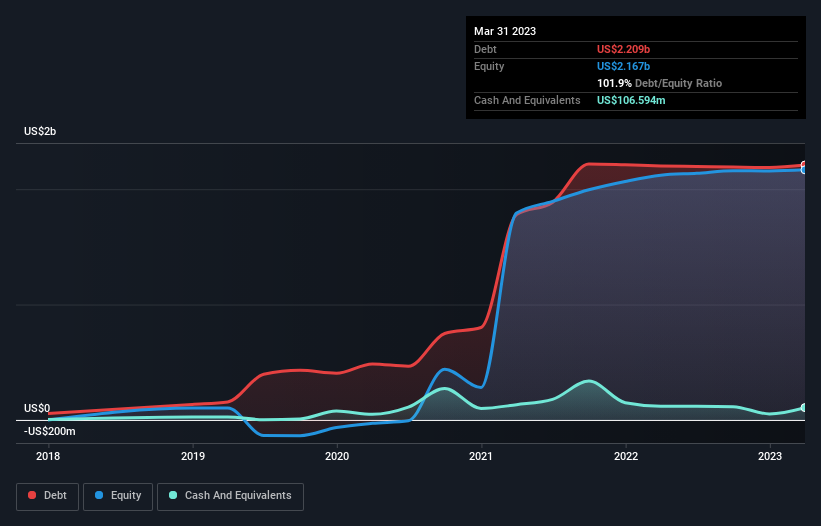- United States
- /
- Healthcare Services
- /
- NasdaqCM:AHCO
Here's Why AdaptHealth (NASDAQ:AHCO) Is Weighed Down By Its Debt Load

Some say volatility, rather than debt, is the best way to think about risk as an investor, but Warren Buffett famously said that 'Volatility is far from synonymous with risk.' When we think about how risky a company is, we always like to look at its use of debt, since debt overload can lead to ruin. Importantly, AdaptHealth Corp. (NASDAQ:AHCO) does carry debt. But should shareholders be worried about its use of debt?
What Risk Does Debt Bring?
Debt assists a business until the business has trouble paying it off, either with new capital or with free cash flow. Part and parcel of capitalism is the process of 'creative destruction' where failed businesses are mercilessly liquidated by their bankers. However, a more common (but still painful) scenario is that it has to raise new equity capital at a low price, thus permanently diluting shareholders. By replacing dilution, though, debt can be an extremely good tool for businesses that need capital to invest in growth at high rates of return. The first thing to do when considering how much debt a business uses is to look at its cash and debt together.
See our latest analysis for AdaptHealth
What Is AdaptHealth's Net Debt?
The chart below, which you can click on for greater detail, shows that AdaptHealth had US$2.21b in debt in March 2023; about the same as the year before. However, because it has a cash reserve of US$106.6m, its net debt is less, at about US$2.10b.

How Healthy Is AdaptHealth's Balance Sheet?
Zooming in on the latest balance sheet data, we can see that AdaptHealth had liabilities of US$524.5m due within 12 months and liabilities of US$2.59b due beyond that. Offsetting these obligations, it had cash of US$106.6m as well as receivables valued at US$353.2m due within 12 months. So its liabilities outweigh the sum of its cash and (near-term) receivables by US$2.66b.
This deficit casts a shadow over the US$1.61b company, like a colossus towering over mere mortals. So we definitely think shareholders need to watch this one closely. After all, AdaptHealth would likely require a major re-capitalisation if it had to pay its creditors today.
We measure a company's debt load relative to its earnings power by looking at its net debt divided by its earnings before interest, tax, depreciation, and amortization (EBITDA) and by calculating how easily its earnings before interest and tax (EBIT) cover its interest expense (interest cover). This way, we consider both the absolute quantum of the debt, as well as the interest rates paid on it.
While AdaptHealth's debt to EBITDA ratio (3.7) suggests that it uses some debt, its interest cover is very weak, at 1.7, suggesting high leverage. It seems that the business incurs large depreciation and amortisation charges, so maybe its debt load is heavier than it would first appear, since EBITDA is arguably a generous measure of earnings. It seems clear that the cost of borrowing money is negatively impacting returns for shareholders, of late. Even worse, AdaptHealth saw its EBIT tank 31% over the last 12 months. If earnings continue to follow that trajectory, paying off that debt load will be harder than convincing us to run a marathon in the rain. When analysing debt levels, the balance sheet is the obvious place to start. But it is future earnings, more than anything, that will determine AdaptHealth's ability to maintain a healthy balance sheet going forward. So if you're focused on the future you can check out this free report showing analyst profit forecasts.
Finally, a company can only pay off debt with cold hard cash, not accounting profits. So we clearly need to look at whether that EBIT is leading to corresponding free cash flow. Looking at the most recent three years, AdaptHealth recorded free cash flow of 40% of its EBIT, which is weaker than we'd expect. That weak cash conversion makes it more difficult to handle indebtedness.
Our View
On the face of it, AdaptHealth's EBIT growth rate left us tentative about the stock, and its level of total liabilities was no more enticing than the one empty restaurant on the busiest night of the year. But at least its conversion of EBIT to free cash flow is not so bad. It's also worth noting that AdaptHealth is in the Healthcare industry, which is often considered to be quite defensive. Taking into account all the aforementioned factors, it looks like AdaptHealth has too much debt. While some investors love that sort of risky play, it's certainly not our cup of tea. The balance sheet is clearly the area to focus on when you are analysing debt. But ultimately, every company can contain risks that exist outside of the balance sheet. For instance, we've identified 3 warning signs for AdaptHealth (1 can't be ignored) you should be aware of.
At the end of the day, it's often better to focus on companies that are free from net debt. You can access our special list of such companies (all with a track record of profit growth). It's free.
New: Manage All Your Stock Portfolios in One Place
We've created the ultimate portfolio companion for stock investors, and it's free.
• Connect an unlimited number of Portfolios and see your total in one currency
• Be alerted to new Warning Signs or Risks via email or mobile
• Track the Fair Value of your stocks
Have feedback on this article? Concerned about the content? Get in touch with us directly. Alternatively, email editorial-team (at) simplywallst.com.
This article by Simply Wall St is general in nature. We provide commentary based on historical data and analyst forecasts only using an unbiased methodology and our articles are not intended to be financial advice. It does not constitute a recommendation to buy or sell any stock, and does not take account of your objectives, or your financial situation. We aim to bring you long-term focused analysis driven by fundamental data. Note that our analysis may not factor in the latest price-sensitive company announcements or qualitative material. Simply Wall St has no position in any stocks mentioned.
About NasdaqCM:AHCO
AdaptHealth
Sells home medical equipment (HME), medical supplies, and home and related services in the United States.
Good value with adequate balance sheet.

